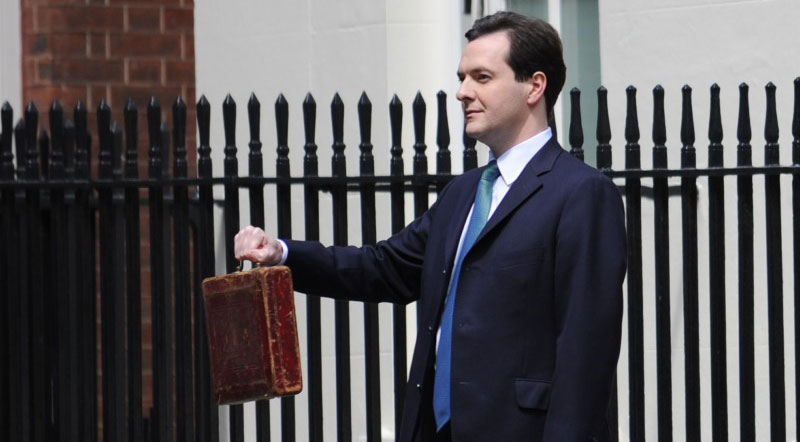
Tri-Service
Osborne: £1.2 Billion Defence Cuts Possible If UK Leaves EU

UK Chancellor George Osborne says he would have to consider cutting the defence budget by £1.2 billion within a couple of months of a vote for Brexit in order to stop Britain plunging into an "economic tailspin".
Mr Osborne warned that a £2.5 billion a year cut in NHS funding, as well as £1.15 billion from education, would also have to be considered as each of these departments lost 2% of their budgets, while pensions spending could be cut by £2 billion a year.
£2.5bn from NHS, £1.2bn from defence and £1.15bn from education are sorts of cuts any Chancellor would have to consider
— George Osborne (@George_Osborne) June 15, 2016
Spending in other areas, including policing, transport and local government, could take a 5% hit, saving £5.8 billion, as part of an overall £15 billion of cuts which might feature in an emergency post-Brexit austerity budget, he added.
Mr Osborne also said potential tax rises could total £15 billion.
Eight days before the June 23 referendum, the Chancellor joined his Labour predecessor Lord (Alistair) Darling to warn that the government might have to hike the basic rate of income tax by 2p to 22% and raise the higher rate by 3p to 43% to fill the "black hole" in the public finances which ministers expect if Britain pulls out of the EU. Lord Darling said:
"It's one of the unfortunate facts of life. If you create a mess you have to clear it up. Far better not to create the mess in the first place."
Furious pro-Brexit Tories branded the idea a "punishment Budget" and warned they would vote to block it.
Some 57 Conservative MPs signed a statement saying the Chancellor's position would be "untenable" if he tried to push the package through - with one backbencher calling for Mr Osborne to resign now.
And Labour leader Jeremy Corbyn made clear that his party would not support any post-referendum Budget which slashes public services or increased austerity.

The Chancellor and PM have warned of the dangers of Brexit
But Lord Darling said that any government dealing with the consequences of a vote to leave the EU would be confronted with the necessity to take "difficult choices" similar to what he faced as chancellor during the 2008 financial crash.
There would be not just a single emergency Budget following a vote to quit the EU, but "one after the other", he said.
Mr Osborne said a Leave vote on June 23 would hit investment, force firms to delay hiring workers and impact on families, leading to a reduction in tax revenues to pay for public services. Standing beside Lord Darling at a Hitachi train plant in Ashford, Kent, Mr Osborne said:
"We have both been Chancellor as the economy has faced very difficult times. We know what happens when we lose control of the economy. We both had to deal with the consequences of the public finances collapsing and the difficult decisions we then had to make."
Failure to deal with the hit to the public finances caused by Brexit would result in an "economic tailspin and a complete loss of confidence in the ability of the country to manage its money", said the Chancellor.
"When we have today even the Leave campaign saying there is going to an economic consequence, people have to know that before they cast their vote."
He said an emergency Budget would be required "within the next couple of months" after a Brexit vote in order to show the world that the UK had "a credible plan" to deal with the deterioration in its public finances which would follow.
His words were echoed by David Cameron, who told MPs at Prime Minister's Questions in the House of Commons:
"Nobody wants to have an emergency Budget, nobody wants to have cuts in public services, nobody wants to have tax increases. But I would say this: there is only one thing worse than not addressing a crisis in your public finances through a Budget, and that is ignoring it.
"If you ignore a crisis in your public finances, you see your economy go into a tailspin, you see confidence in your country reduced. We can avoid all of this by voting Remain next week."
In a joint statement issued by Vote Leave, 57 Conservatives, including Mr Osborne's former Cabinet colleagues Iain Duncan Smith, Liam Fox, Cheryl Gillan, David Jones and Owen Paterson, said it was "incredible" that the Chancellor was "threatening to renege on so many manifesto pledges".
"If the Chancellor is serious then we cannot possibly allow this to go ahead," they said. "It would be unnecessary, wrong and a rejection of the platform on which we all stood.
"If he were to proceed with these proposals, the Chancellor's position would become untenable. This is a blatant attempt to talk down the market and the country. The Chancellor risks doing damage to the British economy in his bid to win this political campaign."
And Mr Corbyn told MPs in the Commons: "We would oppose any post-Brexit austerity Budget, just as we have opposed austerity Budgets from this Government."
Tory MP Nadine Dorries, a long-time backbench critic of the Chancellor, said:
"Osborne has jumped the shark. Believing it is in his gift to deliver such an incompetent Budget is worrying at best. He should resign as Chancellor right now if he believes that Budget would be good for the UK under any circumstances."
A senior Downing Street source said:
"We are setting out very clearly today, as the Chancellor has, the very serious impact leaving the EU would have.
"By 2020, which is the end of this Parliament, any government that's drawing up its plans for the coming years - and a new manifesto - is going to have a £40 billion black hole in the public finances by that stage, so that's a reality that that government will have to deal with."
Asked whether Mr Corbyn would back the use of tax rises to fill the expected shortfall in a post-Brexit budget, the Labour's leader's spokesman said: "We are not going to be in power between 2016 and 2020, unless there's a general election. That's not for us to answer."
The spokesman added: "We would oppose any budget that set out to increase the austerity agenda. We would not support any budget that sliced services. Labour is the party of anti-austerity."
He cautioned that voters could not rely on "Brexit Tories" to block any austerity budget put forward by Mr Osborne.








